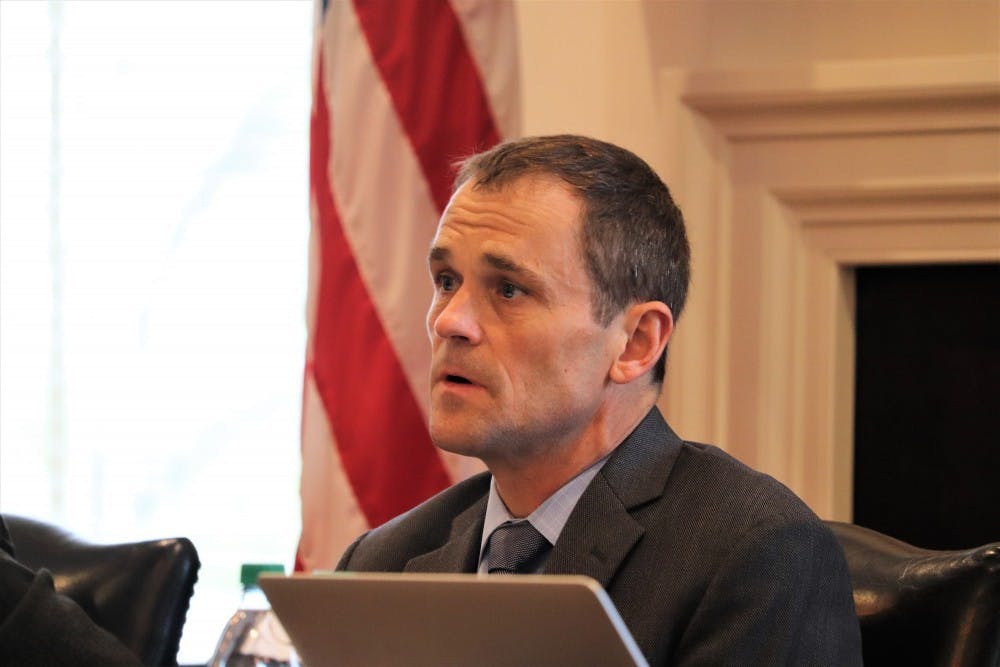University administration announced several policy changes Tuesday afternoon, including a hiring freeze, salary freeze and senior leadership pay cuts, in response to significant financial losses in the academic and health departments amid the COVID-19 pandemic.
Specific details of these changes were emailed to employees in a statement co-written by University President Jim Ryan, Provost Liz Magill, Chief Operating Officer J.J. Davis and Dr. K. Craig Kent, executive vice president for Health Affairs.
“The global economic and public health impact of the COVID-19 pandemic has the potential to have the most disruptive consequences of any downturn any of us has experienced in our lifetimes, reshaping how the University undertakes its missions of teaching, research, service, and patient care,” the statement read.
As a result, the University’s executive leadership team — including Ryan, Magill, Davis and Kent — will take a 10 percent salary reduction to help compensate for University financial losses. The statement also announced a salary freeze for all University employees through the 2021 fiscal year, meaning there will be no merit increases for employee salaries. According to the University’s Coronavirus Updates website, employee compensation will remain stagnant for the next year.
“Due to current and expected financial conditions, all faculty, staff and team member salaries will be frozen at the current levels through at least June 30, 2021,” the website read. “There will be a limited process for granting exceptions for retention, promotion and tenure managed by the Executive Vice Presidents.”
The University has ensured that it will continue to cover tuition costs for low-income students whose families make less and $80,000 a year and tuition costs and fees for those whose families make less than $30,000 a year.
“One of our highest priorities is making U.Va. accessible and affordable for our students and we will continue to meet 100% of their financial need,” states the University's Novel Coronavirus frequently asked questions page.
The University also announced a pause in hiring for all faculty, staff and team member positions. Departments with pre-approved faculty recruitment plans have been asked to meet with Magill and Kent to decide which positions are necessary exceptions to the hiring freeze.
Additionally, all capital projects have been suspended unless they are fully funded and already undergoing construction. All departments are asked to limit all non-essential expenses — such as services, supplies, technology and other costs that are not immediately necessary for operation. The initiation of any new programs is also suspended unless specifically approved by the Executive Vice President.
The statement released by the executive team noted decreases in tuition funding, state funding, clinical care, research grants, endowment returns and philanthropy that are expected to continue over the next few months.
“While the full costs are not yet known, they are large and will grow over the next few months, especially in the health system,” the statement read. “At the same time, the economy and financial markets remain volatile, and there is a good chance of a sustained economic downturn.”
The University’s $9.6 billion endowment has raised questions over whether or not funds may be used to supplement financial losses. However, the endowment’s restrictions prevent it from being applied to the University’s current financial situation.
“First, it is made up overwhelmingly of gifts to the University for specific purposes, like funding professorships and scholarships,” states the Novel Coronavirus updates page. “The University can’t legally spend these restricted gifts on anything other than their intended purpose. Second, the gifts are required to be kept in the endowment in perpetuity, with only the interest earned on the gift available for use.”
The Board of Visitors has set a 4.8 percent rate of use — which is equivalent to over $460 million per year — on the University’s endowment that has been followed strictly for the past five years. During the 2018-2019 fiscal year, this money was spent on the Biocomplexity Institute, the Memorial to Enslaved Laborers and the Bicentennial Scholars Fund. Spending more than this rate would prevent the endowment from providing regular investment returns and violate previously determined restrictions on what purposes the money may be used for.
Plans for the University to resume on a regular operational schedule in fall of 2020 are still unknown. However, if needed, the statement expressed that the University is prepared to take on additional financial losses should the shut-down continue. A separate memo released to University leaders expressed hope for the University’s future success.
“As further implications come into focus, we may need to take additional steps,” the memo read. “The challenges ahead are daunting, but we are confident that if we act quickly and responsibly, and in accordance with our principles and strategic aspirations, our University — and the shared mission that gives us our collective purpose — will flourish.”
Correction: A previous version of this article stated the announcement was made Thursday, and has been updated. Additionally, this article has been updated to accurately identify members of the University's executive leadership team.







